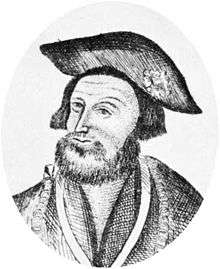
To colliers, carters, and to cooks,
To Jock and Tom my rhyme shall be directed.
To Jock and Tom my rhyme shall be directed.
Sir David Lyndsay (or Lindsay) of the Mount, Lord Lyon King of Arms (c. 1486 – 1555) was the leading Scottish poet and playwright of the mid-16th century; also a courtier, a diplomat, and his country's highest-ranking herald.
Sourced
- Unthrift, sweirnes, falset, povertie, and stryfe
Pat polacey in dainger of hir lyfe.- The Dreme (c. 1528), line 965
- That nicht he sleipit never ane wink,
Bot still did on the Ladie think.- The Historie of ane Nobil and Wailyeand Squyer, William Meldrum (1550), line 899
- Quhowbeit that divers devote cunnyng Clerkis
In Latyne toung hes wryttin syndrie bukis,
Our unlernit knawis lytill of thare werkis,
More than thay do the rauyng of the Rukis.
Quharefore to Colyearis, Cairtaris, & to Cukis,
To Jok and Thome, my Ryme sall be diractit,
With cunnyng men quhowbeit it wylbe lactit.- Ane Dialog Betuix Experience and ane Courteour, off the Miserabyll Estait of the Warld (1554), line 545
- Quhen the Sonne is at the hycht,
Att nonne quhen it doith schyne most brycht,
The schaddow of that hydduous strength
Sax myle and more it is of lenth.
Thus maye ye Juge, in to your thocht,
Gyfe Babilone be heych, or nocht.- Ane Dialog Betuix Experience and ane Courteour, off the Miserabyll Estait of the Warld, line 1752
Criticism
- But in the glances of his eye,
A penetrating, keen, and sly
Expression found its home;
The flash of that satiric rage,
Which, bursting on the early stage,
Branded the vices of the age,
And broke the keys of Rome.
* * *
Still is thy name in high account,
And still thy verse has charms,
Sir David Lindesay of the Mount,
Lord Lion King-at-arms!- Sir Walter Scott Marmion (1808) Canto 4, st. 7.
- Lyndsay, with all his ancient coarseness…maintained for two centuries, even among the precise, his position as the popular poet of Scotland.
- George Gordon The Discipline of Letters (Oxford: Clarendon Press, 1946) p. 91.
- He usually lacks the originality of Henryson and the brilliance of Dunbar and Douglas. But what there is of him is good all through.
- C. S. Lewis English Literature in the Sixteenth Century, Excluding Drama (Oxford: Clarendon Press, 1954) p. 100.
External links
This article is issued from
Wikiquote.
The text is licensed under Creative
Commons - Attribution - Sharealike.
Additional terms may apply for the media files.